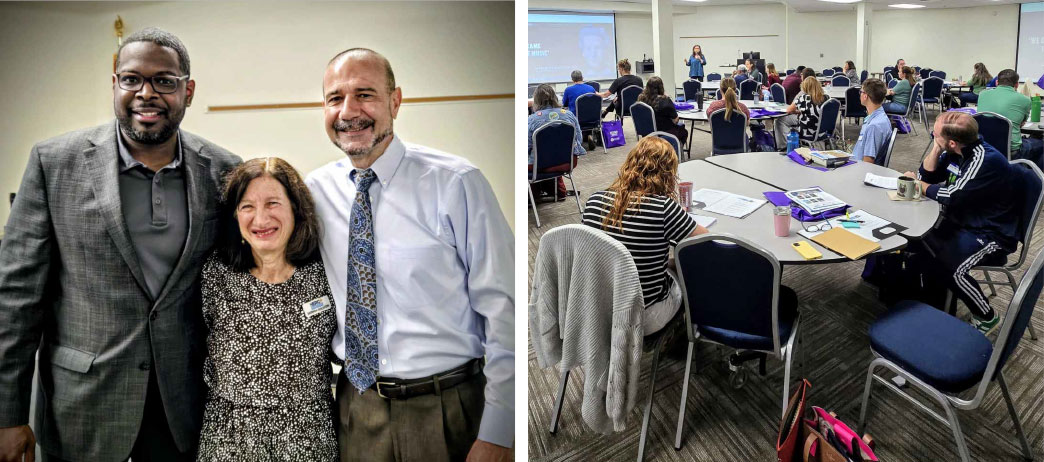The Holocaust Education Resource Council (HERC) hosted its annual teacher workshop designed to equip educators with the materials and resources necessary to teach the history of Holocaust that Florida students are required to learn. This year’s workshop was attended by over 40 teachers from Leon County Schools, and was presented by Alexandra Zapruder, author and Education Director of the Defiant Requiem Foundation. Zapruder paired lessons from Defiant Requiem, a documentary that explores the rehearsing and performance of Verdi’s Requiem in the Terezín (Theresienstadt) ghetto, with Salvaged Pages: Young Writers’ Diaries of the Holocaust, Zapruder’s acclaimed anthology of youth diaries from across wartime Europe.
The morning session of the workshop was devoted to Defiant Requiem, a documentary film and educational program about the performances of Verdi’s Requiem by Jewish prisoners in the Terezín (Theresienstadt) ghetto and concentration camp. Located about 30 miles north of Prague, Czechia, the town of Terezín (Theresienstadt in German) was transformed from a garrison into a Jewish ghetto and concentration camp during the Nazi German occupation of Czechoslovakia during World War II. Unlike many other camps, Terezín held a population of numerous distinguished Jewish prisoners who were scholars, scientists, artists, musicians, and actors. Despite enduring punishing forced labor and starvation, prisoners were able to gather in the evenings to discuss philosophy and religion, create art, write poetry, and rehearse and perform music. For Zapruder these acts of creativity can be understood as acts of cultural resistance and defiance. The film tells the story of conductor Rafael Schächter and the performances of Verdi’s Requiem by Jewish prisoners in the Terezín (Theresienstadt) ghetto and concentration camp.
In 1943, Schächter recruited 150 singers who met for months in a dimly lit basement to learn the Verdi Requiem. Using only vocal music, he taught the complex music accompanied only by piano. Schächter conducted 16 performances of the Requiem for audiences of other prisoners. Replacements for choir members were needed at least three times, as prisoners were continually deported to the Auschwitz-Birkenau extermination camp where most of the performers were killed.
After the screening of the film, teachers were able to speak with Defiant Requiem creator and conductor Murry Sidlin and ask him questions on Zoom. Zapruder closed this session by presenting the Defiant Requiem Foundation’s educational resources, which are designed to adapt to different grade levels and to integrate with state standards in history, music, and language arts. She also highlighted strategies for preparing students emotionally and for teaching difficult content responsibly.
After lunch, the focus shifted to Salvaged Pages: Young Writers’ Diaries of the Holocaust, a collection of memoirs of Holocaust survivors. Zapruder created the book when working at the United States Holocaust Memorial Museum as an intern in 2002 and won the National Jewish Book Award in the Holocaust category. Salvaged Pages provides readers with journal and diary entries from teenagers experiencing the Holocaust and Nazi persecution during World War II in a number of countries across Europe.

By carefully curating and contextualizing these diaries, Zapruder gave readers access to authentic, unfiltered voices of young people who bore witness to persecution, displacement, and extermination. Unlike Anne Frank’s well-known diary, Salvaged Pages illuminates a much broader range of experiences, including those from ghettos, hiding places, and transit camps. Through this work, Zapruder broadened the scope of Holocaust testimony available to educators, ensuring that students could encounter multiple perspectives rather than a single narrative. By foregrounding lived experience, she encourages an approach that humanizes statistics and transforms abstract history into deeply personal encounters.
Zapruder shared pedagogical approaches for using diary excerpts to humanize greater historical events by teaching close reading and historical analysis with corroboration of primary sources to examine people and historical circumstances and contexts in which these texts written under oppression. She demonstrated how short diary excerpts can anchor lessons in chronology, geography, identity, and the everyday life of children and teens in different historical and cultural contexts. In a time when Holocaust memory is increasingly challenged by denial, distortion, and generational distance, Zapruder’s work ensures that young people’s words remain central to collective remembrance. She has enriched Holocaust education by making it more personal, more diverse, and more accessible by allowing readers to encounter not just the history of oppression and destruction, but the individual lives and voices that affirm the sanctity of every life.

